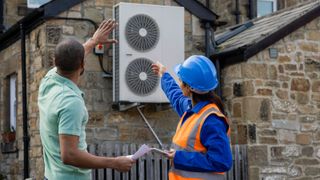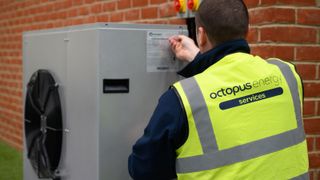Why is Britain lagging behind in its heat pump uptake while the rest of the world steams ahead?
Heat pumps and the race to net-zero: UK's lagging uptake threatens climate goals as worldwide counterparts take big leaps forward

As the world moves towards sustainable energy, the latest data indicates that heat pumps are gaining popularity as a sustainable heating option.
In 2022, global sales of ground and air source heat pumps reached record-breaking figures, driven by increased policy support, incentives, and efforts to reduce greenhouse gas emissions.
While Europe and the United States have witnessed a surge in heat pump sales, the United Kingdom has fallen sorely behind in its targets. In this article, we delve into the reasons behind the UK's low uptake of heat pumps and what the future holds for sustainable heating in the country.
Worldwide heat pump sales grew 11% last year
According to the latest analysis by the International Energy Agency (IEA), global sales of heat pumps grew by 11% in 2022, marking the second consecutive year of double-digit growth for the technology.
The surge in sales was propelled by increased policy support and incentives for heat pumps, driven by high natural gas prices and efforts to reduce greenhouse gas emissions.
In Europe, heat pump sales witnessed a record-breaking year, with sales growing by nearly 40%. In the United States, heat pump purchases surpassed those of gas furnaces for the first time, and in China, which is the world's largest heat pump market, sales remained stable.
Presently, globally, heat pumps when used as the primary heating device, cater to about 10% of heating needs in buildings, amounting to over 100 million households with heat pump sales now rivalling fossil fuel-based heating systems in some markets around the world.
Get the Homebuilding & Renovating Newsletter
Bring your dream home to life with expert advice, how to guides and design inspiration. Sign up for our newsletter and get two free tickets to a Homebuilding & Renovating Show near you.
To align with all existing national energy and climate pledges worldwide, heat pumps will have to fulfil nearly 20% of global heating needs in buildings by 2030. The world is almost on track to reach this milestone if new installations continue to grow at a similar rate globally as they did in the last two years, according to the IEA's research.
Britain's heat pump uptake has stalled
While most of the world's heat pump uptake has risen, the UK is lagging behind drastically. According to the European Heat Pump Association, out of the 21 European countries evaluated, the UK has installed 380,000 heat pumps, ranking it 13th.
However, the UK's performance is much worse in terms of heat pumps per capita in Europe. With only 564 heat pumps per 100,000 people, the UK ranks 20th, just above Hungary.
In comparison, the European average is 4,016 heat pumps per 100,000 people, which means the UK would need approximately seven times more units to meet this standard, totalling 2.7 million heat pumps.
According to figures from Ofgem, the UK government's goal of installing 600,000 heat pumps per year by 2028 seems unlikely to be achieved, as only a total of 42,779 heat pumps were installed in the UK last year.
Despite offering subsidies to reduce costs through the Boiler Upgrade Scheme, which provides subsidies of £5,000 for air-source heat pumps, and £6,000 for ground-source heat pumps, the government has only managed to give out a third of the available grants for this financial year.
The independent Climate Change Committee has stated that 15.3 installations per 1,000 households will be required to achieve the UK's net-zero target by 2050. However, at the current rate, it could take over 600 years to reach the Climate Change Committee's target of having 27.2 million homes with heat pumps by 2050.
Why the huge difference?
The House of Lords environment and climate change committee recently released a report revealing the UK's "disappointingly low" uptake of low-carbon heating systems due to factors such as the government's insufficient promotion of the Boiler Upgrade Scheme, limited public awareness, and inadequate independent advice.
In contrast, countries like Italy have been promoting heat pump usage for a long time, offering special tariffs that cover 100% of the installation costs and also reducing homeowners' taxes by 10% for the next five years.
This generous scheme has led to Italy experiencing the highest growth in heat pump usage in Europe in 2022, as reported by the European Heat Pump Association.
Despite the availability of £5,000 and £6,000 heat pump grants, the high upfront cost of installation, which can be similar to that of a new boiler, remains a significant barrier for households in the UK. The Energy Saving Trust estimates that an air source heat pump typically costs between £6,000 and £8,000, while a ground source installation can cost between £10,000 and £18,000.

Furthermore, due to a shortage of skilled engineers with only 3,000 trained heat pump engineers available in the UK, households that can afford to implement a heat pump may be placed onto a waiting list, with Octopus Energy claiming to have a waiting list of about 50,000 households interested in having air source heat pump installation.
According to David Hilton, Homebuilding & Renovating's heating expert, the UK's lack of uptake of heat pumps can be attributed to various factors. These include the UK's historical reliance on cheap gas and the poor quality of its housing stock, which contrasts with other European countries that have promoted higher performance homes and implemented legislation to encourage better energy efficiency and technology.
The UK's design and installation practices have not instilled confidence in consumers, he added, and legislative barriers must be eased for heat pumps to become a mainstream heating solution. Hilton summarised the situation in the UK: "Things are changing but more needs to be done to enable heat pumps as a common mainstream go-to heating solution."

News Editor Joseph has previously written for Today’s Media and Chambers & Partners, focusing on news for conveyancers and industry professionals. Joseph has just started his own self build project, building his own home on his family’s farm with planning permission for a timber frame, three-bedroom house in a one-acre field. The foundation work has already begun and he hopes to have the home built in the next year. Prior to this he renovated his family's home as well as doing several DIY projects, including installing a shower, building sheds, and livestock fences and shelters for the farm’s animals. Outside of homebuilding, Joseph loves rugby and has written for Rugby World, the world’s largest rugby magazine.